| Srl | Item |
| 1 |
ID:
129535
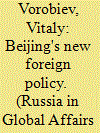

|
|
|
|
|
| Publication |
2014.
|
| Summary/Abstract |
All players expect explanation from China of its initiative to build a New Economic Silk Road. The faster it presents arguments and the clearer they are, the less room there will be for idle speculation and rumor. In any case, China is interested in a favorable response and support for its own foreign policy signals. Chinese leader Xi Jinping first came up with the idea of creating a Silk Road economic space as foreign policy priority for the current, fifth generation of national leaders during a visit in September 2013 to Kazakhstan. In view of the crucial and long-term character of his intention, it is in Russia's interests, as a European and Pacific power and as China's neighbor and long-term bilateral strategic partner, to take a closer look at what content China is putting into this newly conceived project and how the Asian power plans to implement it.
|
|
|
|
|
|
|
|
|
|
|
|
|
|
|
|
| 2 |
ID:
130601
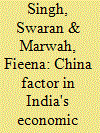

|
|
|
|
|
| Publication |
2014.
|
| Summary/Abstract |
The technology driven time-and-space shrink in recent decade have turned open oceans from barriers to bridges. This has opener new frontiers for trade and transportation, for resource exploitation as also for adventurous scientific explorations into the history 0 human evolution as also into our future. This recent paradigm shift is distinct from the discovery of steam ship leading to naval fleets ancient colonialism in the 19"'century which was focused not only on European powers' control and exploits but also on continental humarjand material resources of their colonies across the world. The recent maritime discourses have instead opened up enormous new avenue entities even to achieve their basic national development and security objectives.
|
|
|
|
|
|
|
|
|
|
|
|
|
|
|
|
| 3 |
ID:
118608
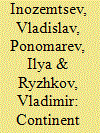

|
|
|
|
|
| Publication |
2012.
|
| Summary/Abstract |
Siberia is an immense territory that stretches for over 12.4 million square kilometers from the eastern slopes of the Urals to the Pacific Ocean. It took Russia more than four hundred years to develop this land in what proved to be the most ambitious colonization effort in history, during which one European people inhabited an area spanning from the eastern edge of Europe to the middle of North America's Pacific coast. Today Siberia's territory is large enough to easily accommodate any contemporary country. At the peak of the expansion (including Russian Alaska) this "European offshoot" (a term coined by Angus Maddison to denote territories occupied by European powers and subsequently inhabited mostly by descendants from Europe) was larger than the New World's Spanish colonies from Cape Horn to California and Texas, and could incorporate British territories in Asia three times over.
|
|
|
|
|
|
|
|
|
|
|
|
|
|
|
|
| 4 |
ID:
019270
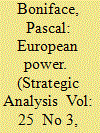

|
|
|
|
|
| Publication |
2001.
|
| Description |
385-392
|
|
|
|
|
|
|
|
|
|
|
|
|
|
|
|
| 5 |
ID:
128024
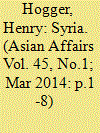

|
|
|
|
|
| Publication |
2014.
|
| Summary/Abstract |
From independence, Syria evolved somewhat differently from other Arab states. When Hafez al-Assad took over, internally he favoured a very Soviet-style centralisation of power and in the eyes of the West his foreign policy made Syria a "pariah" state. When his son Bashar succeeded him, there were hints of an open-ness to new political and economic thinking. European powers started to thicken up their relationship. The US/UK invasion of Iraq put an end to that. The Old Guard regained the ground they had lost. At least on the surface, the economic situation seemed manageable, though agricultural livelihoods were deteriorating sharply. Enter the Arab Spring. The regime's response was brutal and widely condemned, but in an international context very different from that of other threatened Arab regimes. Syria is a major Russian client and an ally of Iran. Nor were there easy choices for the West. The initially-moderate opposition splintered, with Islamist forces increasingly prominent. If there is a slender hope for the future it lies in building on the recent US/Russian diplomatic cooperation over the dismantling of the Syrian chemical weapons arsenal. The improved atmosphere in the talks over the Iran nuclear issue could also be a possible ray of sunlight. But the present situation is grim: casualties are mounting and the immense refugee problem needs more attention from the West.
|
|
|
|
|
|
|
|
|
|
|
|
|
|
|
|
| 6 |
ID:
153483
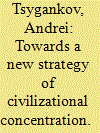

|
|
|
|
|
| Summary/Abstract |
Russian foreign policy successes in the Middle East have created new and more favorable conditions for Russia. These accomplishments include the proactive assertion of independence in the realm of mass media and humanitarian values, development of relations with China and a number of non-Western countries, and stimulatioin of profound changes in the world. The continuing disintegration of the liberal world order and the turn of the West towards national interests and conservative values, which began with Brexit and Donald Trumps victory in the U.S. presidential election, have made it possible for Russia to search for new partners with ideals closer to its own. In this context calls have been more frequent for pushing ahead with a vigorous foreign policy and formalizing a new world order approximating the Congress of Vienna model. In these circumstances, it is important to reconsider the goals and capabilities of Russia as a country with its own, special system of values that takes a unique geopolitical position.
|
|
|
|
|
|
|
|
|
|
|
|
|
|
|
|
| 7 |
ID:
116242


|
|
|
|
|
| Publication |
2012.
|
| Summary/Abstract |
This article explains the establishment of the European Union's Security and Defense Policy (esdp) in 1998-99 and its institutional design. I argue that both the soft balancing explanation and the "second wave" of approaches fall short. In contrast, the article shows that liberal-institutionalist thought and transaction costs economics offer a heuristically promising perspective. Most crucially, the pivotal concept of asset specificity provides explanatory leverage. The combination of risks of opportunism and the non-specificity of esdp's ultimate assets explains why and how the major European powers designed the eu's security and defense pillar in 1998-99. Empirically, I trace how the United Kingdom and France were gradually confronted with not fully credible commitments within nato for crisis management in Europe. Based primarily on the signals sent by us domestic politics, they were increasingly concerned about isolationism and questioned the American commitment to European security. Therefore, they were searching for another institutional option for providing security on a long-term basis. Although this assessment of ex post transaction costs triggered the initial establishment of esdp, ex ante transaction costs were responsible for its more specific design. Given the indirect American threat of disengagement when faced with Europe's aspirations for autonomy, esdp had to be designed in a compatible way with nato. Non-specific, and thus redeployable, military assets represented the institutional solution to the conflict between European autonomy and NATO's primacy. In other words, asset specificity as the key analytical concept of transaction costs economics is what differentiates this argument from previous accounts and provides a more comprehensive framework for understanding both the establishment and design of esdp in 1998-99.
|
|
|
|
|
|
|
|
|
|
|
|
|
|
|
|